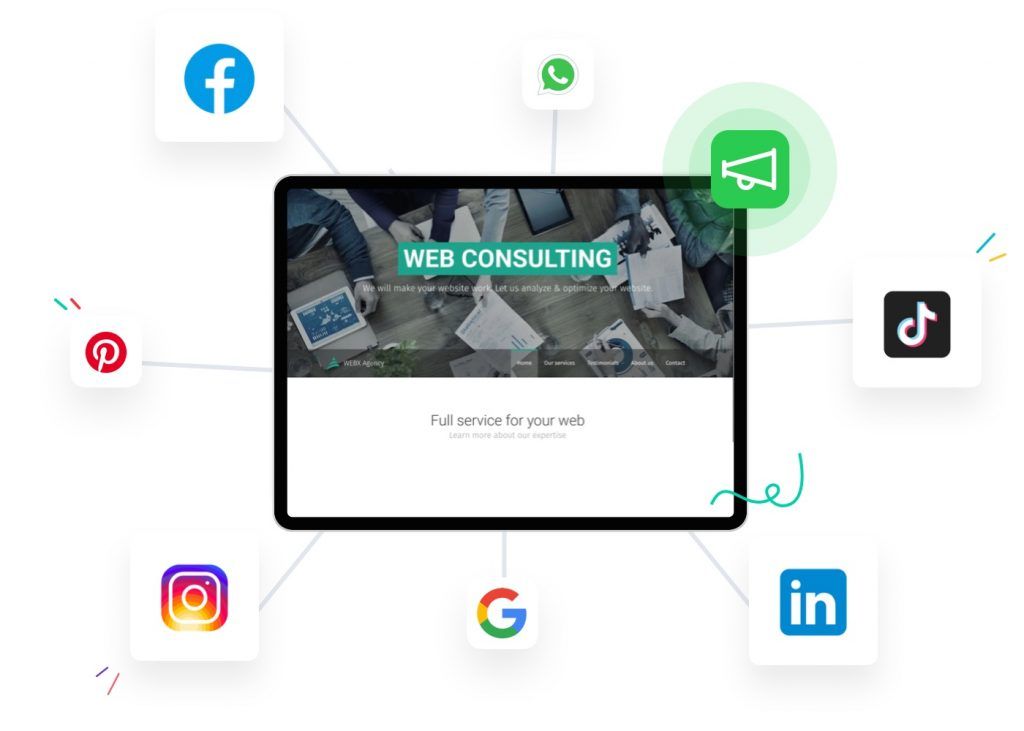How to become self-employed?

You have the ambition to start as a self-employed professional, but you’re not sure what it involves... You’re in luck; in this blog article, we’ll tell you everything you need to know about becoming self-employed. Don’t forget to check out our tips!
- Is becoming a self-employed entrepreneur right for you?
- Becoming self-employed: pros and cons
- Starting as a self-employed professional: legal structures and forms
- Steps to becoming self-employed
- 1️⃣ Take time to do your research and create a plan
- 2️⃣ Complete all legal and administrative steps
- 3️⃣ Meeting tax and social security obligations as a self-employed person
- 4️⃣ Choose an appropriate business name
- 5️⃣ Put your business on the map
- 6️⃣ Find the right work-life balance
- 7️⃣ Dare to adjust
- Frequently asked questions about becoming self-employed
Is becoming a self-employed entrepreneur right for you?
"I want to be self-employed," many people proclaim loudly, but in the end, it often remains just talk. That's because starting as a self-employed professional is a significant life change. It's not a decision to be made lightly; you need to think it through carefully.
If you want to become a self-employed entrepreneur, you must fully understand that your life will look entirely different compared to being an employee. You alone are responsible for your own income.

Being your own boss
Starting your own business usually stems from a specific drive. The desire to be your own boss, the wish to turn your greatest passion into a profession, the ambition to build your own company from the ground up... If this idea excites you, it's definitely worth considering becoming self-employed, even on a small scale.
Of course, keep in mind that certain sacrifices will be necessary. Self-employed entrepreneurs often lead very busy lives, which can lead to the work-life balance—yes, you guessed it—being thrown off-kilter. This is something you'll need to carefully manage.
Fortunately, you gain a great deal of satisfaction from running your own business. It gives you the opportunity to turn your passion into your profession. If you enjoy variety, challenge, responsibility, and have a clear goal in mind, then it's a good idea to start turning your plans into reality.
Becoming self-employed: pros and cons
Anyone who thinks logically understands that becoming fully self-employed comes with both advantages and disadvantages. The points we list below are all factors you should consider when deciding whether or not to start working for yourself.
Advantages of becoming self-employed:
Being able to chart your own course and experience a great deal of freedom... For many, this is one of the major benefits of being self-employed. You decide how to spend your time, how to build your business, and make all the decisions without having to answer to a boss.
Living your passion to the fullest every day is another wonderful aspect of starting as a self-employed professional. During busy times, that sense of fulfillment will undoubtedly give you energy.
All the profit you make is yours alone. If your business is thriving, you might even earn more than you would as an employee. Of course, you’ll need to work hard for it!
If you want to become self-employed in Belgium, you'll quickly notice that there are financial challenges involved. Think of paying VAT, making investments, and covering labor costs... Fortunately, you can also enjoy some tax benefits by incurring business expenses.

Disadvantages of becoming self-employed:
As a self-employed entrepreneur, you don’t have a fixed income, and your earnings can fluctuate depending on the market, your clients, the success of your business, and other factors. This can be stressful, especially during periods of low revenue or when you need to make unexpected investments. For this reason, some people prefer to start with a side business first.
While the idea of not having to answer to anyone may sound appealing, it can also be a significant challenge. You have to juggle many different responsibilities—from running your business to managing the marketing behind it... it all falls on your shoulders. In contrast, as an employee, you can rely on colleagues and have more specific tasks.
We don’t want to be pessimistic, but we have to be honest: in the worst-case scenario, your business could fail. What if you end up in debt? Go bankrupt? Anyone looking to start their own business must consider these risks. That’s why it’s crucial to choose the right legal structure for your business, such as a sole proprietorship or a company. More on that in a moment!
Running a successful business doesn’t happen overnight. It requires a lot of effort, which often means long working hours, starting early and ending late. During certain periods, there might not be much time left for leisure and relaxation.
As a self-employed person, you must take care of your own social security. Building up pension rights, receiving benefits in case of illness or disability... you’ll need to organize all of this yourself by paying social contributions. You can read more about this on the website of the social insurance fund Acerta.
Starting as a self-employed professional: legal structures and forms
There are various ways to start a self-employed business, and several types of business structures exist.
The type of business structure or legal form under which you operate your own business is crucial. The exact legal form you choose will determine, among other things, the type of accounting you need to maintain, the taxes you’ll pay, and the level of liability that applies to you. Be sure to research everything thoroughly and select the form that best suits your needs.
Legal structures:
➡️ Full-time self-employed
Starting as a full-time self-employed professional means you are one hundred percent dedicated to being an entrepreneur. Read on this website to learn what you need to know about this social status.
➡️ Part-time self-employed
The biggest difference between being full-time and part-time self-employed lies in the social status. A full-time self-employed person is entirely focused on their business, while as a part-time self-employed person, you also maintain employment with an employer.
Also read
Becoming part-time self-employed: what you need to know.

Different forms of enterprise:
➡️ Sole proprietorship
You start a sole proprietorship as a natural person. Beware: in this case, there is no real separation between your own personal assets and those of your own company.
This means that all your assets, including personal ones, are liable for the debts and risks associated with your business.
For those entering the entrepreneurial world for the first time, a sole trader structure can be a practical option. Starting as a sole trader is relatively quick and straightforward. It involves less administrative work, lower costs, and simple bookkeeping requirements.
Tip
Enrich your knowledge and learn how to set up a sole proprietorship in Belgium.
➡️ Company
A company, on the other hand, is a business structure with legal personality. This means it is recognized as a separate legal entity from its owners. A company has its own rights, obligations, and assets, which are distinct from the personal assets of its shareholders.
Did you know that there are various types of companies? For instance, there’s a private limited company (bv), a public limited company (nv), or a general partnership (vof). These are just a few of the options available; you can read more about them on the website of the business registration office Xerius.
Steps to becoming self-employed
1️⃣ Take time to do your research and create a plan
Should you become self-employed or not? If you do your homework and create a solid plan, it will soon become clear whether your business idea has a chance of success... or not. Proper preparation is key to the success of your self-employment journey.
Start by critically assessing your project. Want to open a hair salon? Great, but maybe you're the umpteenth one in your city or village... Will the competition be too intense?
Or suppose you want to sell homegrown plants. Do you know who your target audience is, who your potential customers are, and what the current market for plant shops looks like? Conduct a target audience and market analysis to find out.
If you choose to sell your plants online, you'll need an e-commerce platform. This involves several considerations, but fortunately, at Combell, you’ll find all the tools you need to launch your own webshop easily and affordably. Always choose a platform that fits your business.
Starting as a self-employed professional also means you should prepare a business plan. A business plan is the internal compass of your venture. It can outline your goals, plans, marketing actions, and financial situation. It's something to refer back to when you're unsure about certain decisions.

Your business plan should also include a separate financial plan. This financial plan tracks your company's financial situation, giving you a clearer view of your available budget.
A business plan serves as a guide for you as an entrepreneur. So even if you're not required to create one (for a sole proprietorship), it's still wise to do so. The Flemish government offers tips on how to craft a solid business plan.
Another thing you need to prepare for is the day-to-day running of your business. When will you start? What do you need to get started? How will you offer your products? Which suppliers and/or delivery companies will you partner with?
2️⃣ Complete all legal and administrative steps
If you want to start your own business, you need to take several crucial legal and administrative steps. Without completing these steps, simply put: you won't be able to start!
Administrative checklist becoming self-employed:
- Obtain a company registration number. Apply for a company registration number with the Crossroads Bank for Enterprises (KBO). To do this, you must first register with one of the recognized business registration offices.
- Get a VAT number. Ensure your company registration number is activated as a VAT number.
- Secure mandatory and supplementary insurance. Take out necessary insurances such as liability and disability insurance.
- Check required licenses and permits. Determine which licenses and permits you need for your business.
- Open a (business) bank account. Set up a separate bank account for your business transactions.
- Register with a social insurance fund. Join a social insurance fund. This website can help you get started.
- Collaborate with an accountant. Work with an accountant and start managing your financial administration by purchasing accounting software.
3️⃣ Meeting tax and social security obligations as a self-employed person
For this, we will assume that you have set up a sole proprietorship.
VAT:
You are liable for VAT in most cases. So you have to charge VAT to your customers.
As a self-employed person, you also have to pay VAT yourself, but you can deduct it from the VAT you have charged to your clients (VAT deduction).
To pay VAT, you must file periodic VAT returns. The difference between the VAT you received through your customers and the VAT you paid yourself must be passed on to the VAT authorities.
If your turnover does not exceed 25,000 euros excluding VAT and your activity has nothing to do with performing works in immovable property, you fall under the VAT exemption.

Social security:
As a self-employed person, you have to take care of your own social security. Building up pension rights, getting sickness and disability benefits ... You are responsible for it yourself by paying social security contributions. Read more about it at social insurance fund Acerta.
Tip
Those who are self-employed in their main profession must pay a minimum quarterly contribution to be insured. In a secondary occupation, this is different. Incidentally, only self-employed people in main occupation and pensioners can apply for exemption from their social security contributions. Something the self-employed in a secondary occupation are never entitled to.
Taxes:
If you own a sole proprietorship, you file a tax return each year through the mandatory personal income tax. You will have to pay taxes on your net professional income.
This is the sum remaining after offsetting your professional income minus your professional expenses (deductible expenses). If you use a sole proprietorship to practice your secondary profession, then your salary as an employee and the income from your independent secondary profession are added together. In some cases, this puts you in a higher taxable bracket ...
Note: becoming self-employed also means that you will have to pay certain additional taxes. These range from municipal taxes to an environmental tax.
4️⃣ Choose an appropriate business name
If you want to start your own business, you obviously need to choose an appropriate business name. You are not the union without a name. 😜
An appropriate business name is very important. Your company name should stick in the minds of your customers, show what you stand for as well as come across as professional.
When choosing a company name, you should consider the online component of your business. Having your own website or webshop is a big must. So think carefully about the domain name (everything after the www in the address bar) that goes with your company name.
Tip
Register your domain name with a professional hosting company such as Combell. With us, you also get numerous benefits and free extras.
Thinking of a perfect company name whose domain name is still available? If you need some help with that, you can use our company name generator, designed to create unique names.
Tell us what your company stands for, select the desired language and experiment with style and type. Afterwards, our AI tool generates business names that are in line with what you requested.
That's how you start your own business with the right, memorable company name. You get all kinds of unique suggestions. With the icing on the cake: you immediately see whether the corresponding domain name is still available.

5️⃣ Put your business on the map
Are you well prepared, is your planning in order, have you struggled through the paper mill? High time to quietly launch your business and run promo.
Use social media for this, which you can link to your website. Through channels like Instagram and Facebook, you can advertise for free or at a competitive price. Especially in the beginning, you will have to find budget-friendly ways to do promo. Word-of-mouth advertising is important, but you can also do flyers, small promotions, etc.
Once your business is up and running, you should experiment with online marketing and advertising. In between, you will need to network, as the outside world needs to get to know you.
Three effective ways to attract customers:
- Do email marketing by sending newsletters and other promo emails to subscribers. If you want to do that in a professional way, use Flexmail. As a Combell customer, you do that in a very inexpensive way.
- Get the SEO settings of your site or shop right. By using SEO, you will score in Google and get organic traffic on your website.
- If you want to make additional investments over time, you can start with lead generation. With tools like Leadinfo, you find out which companies are visiting your website. Our customers can test Leadinfo for free for 14 days and even get a 15% discount on packages afterwards.
6️⃣ Find the right work-life balance
Perhaps the most difficult hurdle to overcome: how are you going to combine life as a self-employed person with your private life? On the one hand, it's a matter of “learning by doing,” but on the other hand, it's important to have a view of your daily schedule in advance. Time management is therefore crucial. Questions to ask yourself:
- When does your workday start and stop?
- Will there be a closing day?
- When will you do your bookkeeping and administration?
- At what times do you plan to rest?
- Is your business compatible with your family life, how do you see it?
- ...
7️⃣ Dare to adjust
Starting out as self-employed ... You probably have a certain image about it and are determined to run your business that way. Still, don't cling too hard to that dream scenario. Becoming self-employed comes with (financial) risks and challenges.
Chances are, while you've already started self-employment, you'll need to adjust and tweak certain things. Maybe you work too many hours, or just too few, or maybe you have to invest in online advertising sooner than expected...
Don't let this throw you off balance. Dare to make adjustments and let your own business grow in a way that feels right. You, and you alone, hold all the reins. Remember 😉


